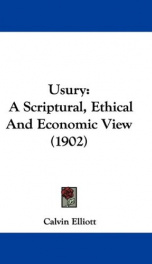Usury

TO MY READERS.I beg the sincere and thoughtful consideration of this book by all its readers. Please follow the argument in the order in which it is presented. This is the way it developed in my own mind and led me, step by step, irresistibly to its conclusions. Do not read the closingchapters first, but begin with the "_Definition_." I believe every candid reader doing this, and having a logical mind, will fully and heartily concur in the condemnation of usury.I hope these arguments will be fairly treated and justly weighed even by those whose interests seem in conflict. I have simply sought the truth, believing that "the truth shall make you free." It cannot be that this or any truth is in real conflict with the highest welfare of any man.If any sincere friends of this truth are grieved that the argument is so crudely and roughly stated, I can only say in excuse, that, so far as I know or can learn from the great librarians I have consulted, this is the first attempt ever made to fully present the anti-usury argument, and I sincerely hope that others, profiting by my effort, may be able to make it more effective. THE AUTHOR.CHAPTER I... DEFINITION. In the evolution of the English language, since the making of our King James version of the Bible, many new words have been introduced, and many old ones have changed their meanings.In the nearly three hundred years the Saxon word "let," to hinder, has become obsolete. It was in common use and well understood when the version was made, but is now misleading. Thus we have in Isaiah 43:13: "I will work and who will let (hinder) it?" Paul declared that he purposed to go to Rome, "but was let (hindered) hitherto." Rom. 1:13.Again we have in II Thess. 2:7: "Only he who now letteth (hindereth) will let (hinder), until he be taken out of the way."....... --This text refers to the Kindle Edition edition.
Info about the book
Author:
Series:
Unknown
ASIN:
B008IPF4EG
Rating:
2.5/5 (4)Your rating:
0/5
Languge:
English
Users who have this book
Users who want this book
What readers are saying
What do you think? Write your own comment on this book!
write a commentif you like Usury try:
Other books by this author
Do you want to exchange books? It’s EASY!
Get registered and find other users who want to give their favourite books to good hands!


